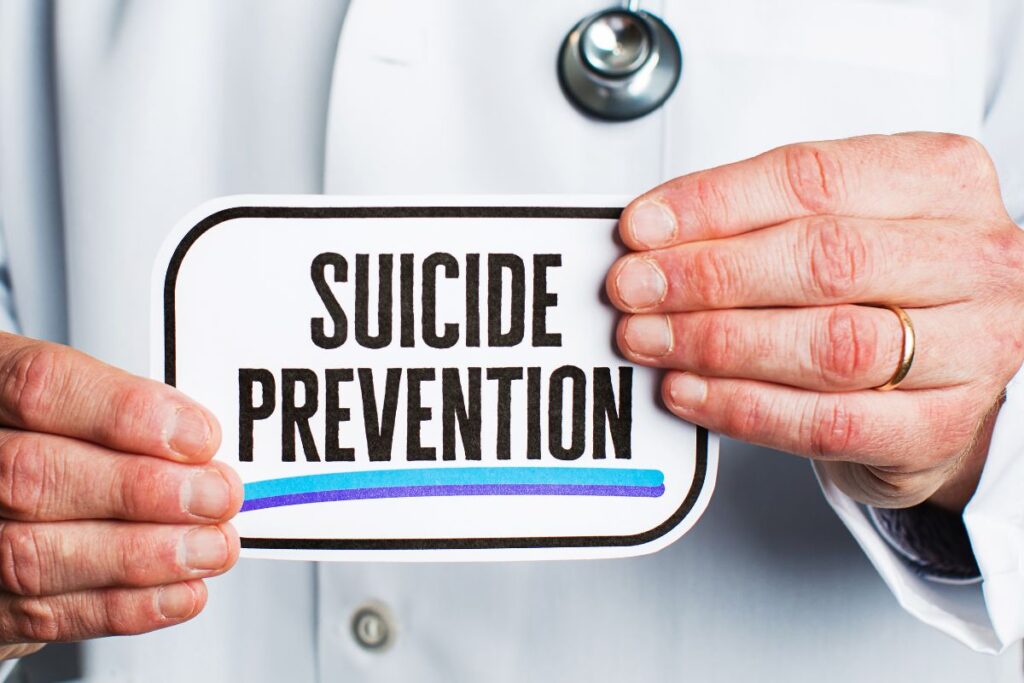The Center for Disease Control and Prevention says suicide is a serious public health issue.
For this reason, mental health professionals should consider suicide intervention training to identify, assess, and manage individuals at risk. Advanced training can enhance patient outcomes and save lives.
And because suicide is not merely an impulsive act but often results from multiple interrelated factors, training in suicide prevention is essential.

Here’s what you need to know:
Key Highlights:
1. Mental health professionals need to undergo advanced suicide intervention training to identify, assess, and manage individuals at risk.
2. Advanced training programs focus on enhancing clinicians’ ability to conduct thorough risk assessments and develop tailored intervention plans for suicidal patients.
3. Effective suicide intervention involves developing a safety plan, which includes identifying warning signs, coping strategies, and sources of support for the patient during a crisis.
4. Communication skills are crucial in suicide intervention, emphasizing active listening, validation, and non-judgmental communication to build a strong therapeutic partnership.
5. Suicide prevention training provides strategies for self-care and professional support for clinicians, helping to prevent burnout and promote long-term sustainability in the profession.
With this in mind, let’s dive into how health practitioners can take advantage of suicide intervention strategies through specialized courses.
What Are the Intervention Strategies for Suicidal Clients?
According to the National Institute of Mental Health, suicide is the number one cause of death in the United States. And it affects everyone, regardless of gender, race, ethnicity, or age. Because suicidal causes are complex, interventions must include various approaches to get to the root of the problem.
Here are some issues to consider:
Advanced training programs
Advanced training programs enhance clinicians’ ability to conduct thorough risk assessments. Assessing suicide risk involves evaluating various factors, such as previous suicide attempts, mental health history, current stressors, and protective factors.
Training programs teach health professionals to ask the right questions and interpret the answers accurately, ensuring they don’t overlook any critical detail. This in-depth assessment creates a robust foundation for effective intervention. It enables you to develop a tailored intervention plan for suicidal patients.
Safety Plan
Developing a safety plan is a crucial component of suicide intervention. A well-structured safety plan involves identifying warning signs, coping strategies, and sources of support the patient can rely on during a crisis. Advanced training courses guide practitioners in producing effective, individualized, and practical safety plans.
They should serve as a vital resource for patients, providing them with a clear course of action when they feel overwhelmed.
Communication Skills
Communication skills are also a key focus in suicide prevention training. Therapists must create a safe and empathetic environment where patients feel comfortable sharing their thoughts and feelings.
Specialized training emphasizes active listening, validation, and non-judgmental communication. These skills help build a strong therapeutic partnership, which is essential for effective intervention.
Dealing with the Emotional Impact
Managing the emotional impact of working with suicidal patients is another important aspect of advanced training. Clinicians often experience significant stress and emotional burden in these cases.
Training courses provide strategies for self-care and professional support, helping counselors maintain their own well-being while providing the best possible care to their patients.
This aspect of training helps prevent burnout and promotes long-term sustainability in the profession.
Cultural factors
One of the critical elements of effective suicide intervention is to recognize and address cultural factors that influence suicidal behavior. Different cultures have varying beliefs, stigmas, and attitudes towards mental health and suicide.
Training at the highest level equips professionals with cultural competence, enabling them to understand and respect these differences. Ultimately, this results in culturally sensitive and appropriate communication and interventions.
Evidence-based practices
Evidence-based practices are central to advanced suicide intervention training. Therapists learn to apply effective, research-based interventions. For example, Cognitive Behavioral Therapy (CBT), Dialectical Behavior Therapy (DBT), and other evidence-based approaches are part of these programs.
These therapies help patients develop coping mechanisms, challenge negative thought patterns, and build resilience. Incorporating these evidence-based practices into treatment plans leads to positive outcomes.
Ethical Considerations
Ethical considerations are also an integral part of suicide prevention training. Counselors must manage complex dilemmas, such as balancing patient confidentiality with protecting individuals from harm.
Advanced training guides how to approach these challenges, helping practitioners make informed and ethical decisions. Understanding the legal and ethical frameworks surrounding suicide intervention results in responsible and professional care.
Collaborations
Collaboration with other healthcare providers and community resources makes suicide intervention effective. Training programs focus on a multidisciplinary approach where suicide experts partner with psychiatrists, primary care providers, social workers, and other professionals.
This collaborative approach makes patient care comprehensive, addressing all aspects of their well-being. Program attendees also learn how to connect with patients through community resources such as crisis hotlines, support groups, and emergency services.
Ongoing education and training
Ongoing education and training are necessary to maintain proficiency in suicide treatment. This is because mental health is constantly evolving, with new research and best practices emerging regularly.
Specialized training courses encourage students to stay updated with the latest developments through continuous education. This commitment to lifelong learning equips clinicians with the most current and effective tools for suicide therapies.
Here are more benefits of continuing professional development:
- Training programs include opportunities for practical application through role-playing, simulations, and supervised practice. These hands-on experiences build confidence and competence in suicide intervention.
- Learners can apply their skills in a controlled environment, receive feedback, and refine their techniques. This practical aspect of training bridges the gap between theory and practice, preparing practitioners for real-world scenarios.
- Patients benefit from therapists with a wealth of experience through comprehensive, compassionate, and effective care. As a result, suicidal clients can feel understood, supported, and hopeful when they receive care.
- Also, specialized training can contribute to the goal of reducing suicide rates and improving mental health at a community and societal level.
Mental health organizations
Mental health organizations and institutions also support advanced suicide intervention training. Providing access to high-quality training programs, resources, and ongoing professional development opportunities is essential. Institutions that prioritize training demonstrate a commitment to excellence in patient care and advance the mental health profession.
If you want advanced training in suicide intervention, several reputable programs and organizations offer expert-driven courses. The American Association of Suicidology (AAS), the Suicide Prevention Resource Center (SPRC), and the National Suicide Prevention Lifeline (NSPL) are excellent starting points.
These bodies provide widely recognized resources, training programs, and certification opportunities.
Make Headway into Effective Suicide Interventions
Ready to jumpstart your knowledge about suicide therapies? Online CE Credits provides one of the most up-to-date certifications from experienced instructors. Learning the lessons is a breeze since you can complete them at your own pace, anywhere, anytime.

Select your relevant course from the programs below:
- Suicide and Parasuicide in BPD: Evidence-Based Strategies
- Suicide Assessment and Documentation: Using the L-RAMP
- At the Intersections: Suicide Prevention for BIPOC & 2SLGBTQIA+ Youth
Take a Leading Role in Suicidal Intervention
Ultimately, the goal of advanced suicide prevention training is to save lives.
Training courses equip you with the skills, knowledge, and confidence to intervene effectively and make a significant impact. Also, you can create a long-lasting difference in individuals’ lives at risk of suicide as you give them hope and support during their darkest moments.
Ongoing education is a great investment in the patient’s well-being and the broader community.
Now Is the Time to Boost Your Credentials and Skills:
Advanced training in suicide intervention is a vital part of your professional development. It improves your ability to assess risk, develop safety plans, communicate effectively, manage your own well-being, and apply evidence-based practices.
Additionally, specialized courses put you on the right path to prevent suicide and promote mental health for clients. And Online CE Credits has affordable courses to help you kickstart your journey without breaking the bank. Stop feeling stuck at your current skill level. Get advanced training and certifications to level up your career today!